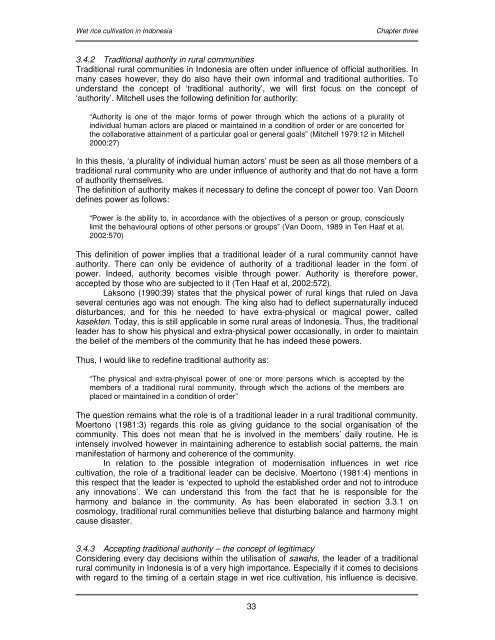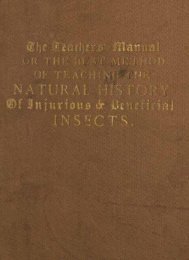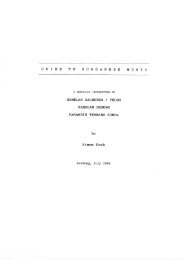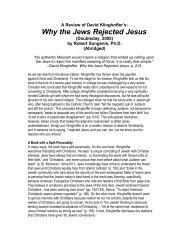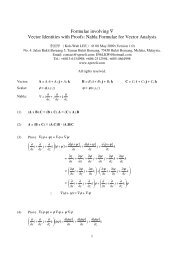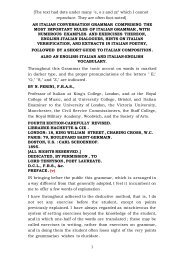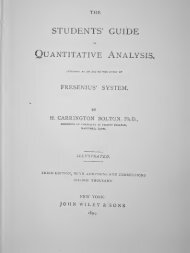Wet rice cultivation in Indonesia - Free EBooks Library
Wet rice cultivation in Indonesia - Free EBooks Library
Wet rice cultivation in Indonesia - Free EBooks Library
Create successful ePaper yourself
Turn your PDF publications into a flip-book with our unique Google optimized e-Paper software.
<strong>Wet</strong> <strong>rice</strong> <strong>cultivation</strong> <strong>in</strong> <strong>Indonesia</strong> Chapter three<br />
3.4.2 Traditional authority <strong>in</strong> rural communities<br />
Traditional rural communities <strong>in</strong> <strong>Indonesia</strong> are often under <strong>in</strong>fluence of official authorities. In<br />
many cases however, they do also have their own <strong>in</strong>formal and traditional authorities. To<br />
understand the concept of ‘traditional authority’, we will first focus on the concept of<br />
‘authority’. Mitchell uses the follow<strong>in</strong>g def<strong>in</strong>ition for authority:<br />
“Authority is one of the major forms of power through which the actions of a plurality of<br />
<strong>in</strong>dividual human actors are placed or ma<strong>in</strong>ta<strong>in</strong>ed <strong>in</strong> a condition of order or are concerted for<br />
the collaborative atta<strong>in</strong>ment of a particular goal or general goals” (Mitchell 1979:12 <strong>in</strong> Mitchell<br />
2000:27)<br />
In this thesis, ‘a plurality of <strong>in</strong>dividual human actors’ must be seen as all those members of a<br />
traditional rural community who are under <strong>in</strong>fluence of authority and that do not have a form<br />
of authority themselves.<br />
The def<strong>in</strong>ition of authority makes it necessary to def<strong>in</strong>e the concept of power too. Van Doorn<br />
def<strong>in</strong>es power as follows:<br />
“Power is the ability to, <strong>in</strong> accordance with the objectives of a person or group, consciously<br />
limit the behavioural options of other persons or groups” (Van Doorn, 1989 <strong>in</strong> Ten Haaf et al,<br />
2002:570)<br />
This def<strong>in</strong>ition of power implies that a traditional leader of a rural community cannot have<br />
authority. There can only be evidence of authority of a traditional leader <strong>in</strong> the form of<br />
power. Indeed, authority becomes visible through power. Authority is therefore power,<br />
accepted by those who are subjected to it (Ten Haaf et al, 2002:572).<br />
Laksono (1990:39) states that the physical power of rural k<strong>in</strong>gs that ruled on Java<br />
several centuries ago was not enough. The k<strong>in</strong>g also had to deflect supernaturally <strong>in</strong>duced<br />
disturbances, and for this he needed to have extra-physical or magical power, called<br />
kasekten. Today, this is still applicable <strong>in</strong> some rural areas of <strong>Indonesia</strong>. Thus, the traditional<br />
leader has to show his physical and extra-physical power occasionally, <strong>in</strong> order to ma<strong>in</strong>ta<strong>in</strong><br />
the belief of the members of the community that he has <strong>in</strong>deed these powers.<br />
Thus, I would like to redef<strong>in</strong>e traditional authority as:<br />
“The physical and extra-phyiscal power of one or more persons which is accepted by the<br />
members of a traditional rural community, through which the actions of the members are<br />
placed or ma<strong>in</strong>ta<strong>in</strong>ed <strong>in</strong> a condition of order”<br />
The question rema<strong>in</strong>s what the role is of a traditional leader <strong>in</strong> a rural traditional community.<br />
Moertono (1981:3) regards this role as giv<strong>in</strong>g guidance to the social organisation of the<br />
community. This does not mean that he is <strong>in</strong>volved <strong>in</strong> the members’ daily rout<strong>in</strong>e. He is<br />
<strong>in</strong>tensely <strong>in</strong>volved however <strong>in</strong> ma<strong>in</strong>ta<strong>in</strong><strong>in</strong>g adherence to establish social patterns, the ma<strong>in</strong><br />
manifestation of harmony and coherence of the community.<br />
In relation to the possible <strong>in</strong>tegration of modernisation <strong>in</strong>fluences <strong>in</strong> wet <strong>rice</strong><br />
<strong>cultivation</strong>, the role of a traditional leader can be decisive. Moertono (1981:4) mentions <strong>in</strong><br />
this respect that the leader is ‘expected to uphold the established order and not to <strong>in</strong>troduce<br />
any <strong>in</strong>novations’. We can understand this from the fact that he is responsible for the<br />
harmony and balance <strong>in</strong> the community. As has been elaborated <strong>in</strong> section 3.3.1 on<br />
cosmology, traditional rural communities believe that disturb<strong>in</strong>g balance and harmony might<br />
cause disaster.<br />
3.4.3 Accept<strong>in</strong>g traditional authority – the concept of legitimacy<br />
Consider<strong>in</strong>g every day decisions with<strong>in</strong> the utilisation of sawahs, the leader of a traditional<br />
rural community <strong>in</strong> <strong>Indonesia</strong> is of a very high importance. Especially if it comes to decisions<br />
with regard to the tim<strong>in</strong>g of a certa<strong>in</strong> stage <strong>in</strong> wet <strong>rice</strong> <strong>cultivation</strong>, his <strong>in</strong>fluence is decisive.<br />
33


